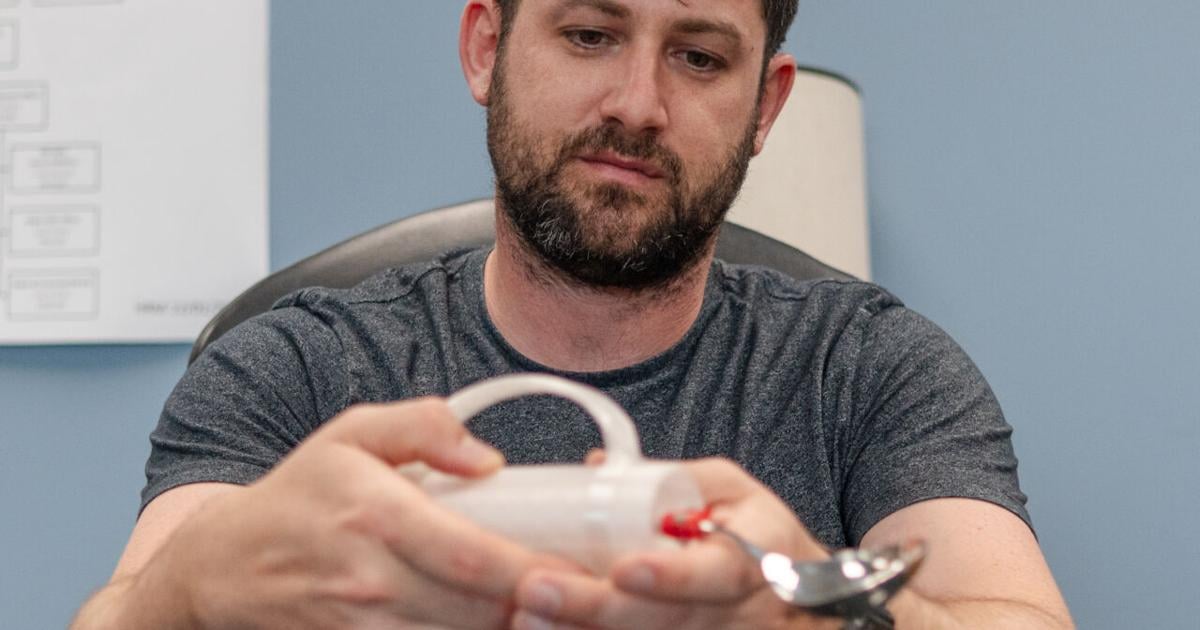A few weeks ago, Noam Pratt and Philip Dunham set up shop at Camp Dream Street, an overnight camp for children with disabilities in Mississippi.
One camper, who uses a wheelchair, said he had trouble drawing on a clipboard without a table nearby, so Pratt and Dunham worked with him to customize a design to fit his needs: Overnight, they 3D printed a curved lap desk that fit his legs perfectly, customizing it with his name and a protruding Godzilla head.
I made a small clip to secure a feeding tube for a camper whose tube kept slipping off the back of his wheelchair, and a clip to attach a flashlight to a cane for another camper who is visually impaired.
MakeGood founder Noam Pratt inspects a design for keeping spoons upright at UNO in New Orleans, Tuesday, June 25, 2024. (Photo by Matthew Parshall, The Times-Picayune) Staff photo by Matthew Parshall▲
In the grand scheme of technological advances, these items weren’t particularly hard work — they took less than a day to design and print and cost no more than a few dollars — but for the campers, they made a big difference.
Pratt works at MakeGood, a New Orleans-based nonprofit that develops customized assistive technology to help people with disabilities solve problems they encounter in everyday life.
The nonprofit gained national attention last year for its Toddler Mobility Trainer — a tiny wheelchair made of wood and plastic that helps young children get around — but its range of products is constantly expanding, fueled by open-source design, 3D printing, and the input and creativity of people in the disability community. Past designs have included a plastic piece that keeps the wheelchair buckled in when not in use, and a handle to help grip a toothbrush or other utensils.
“The main reason people contact us is because they can’t find what they need off the shelf, and we can make something that really fits their specific need very inexpensively,” Pratt says. “Through our work, we’ve found that most people come to us with pretty much an exact idea of what they need, they just need help making it a reality.”
Makegood designer Philip Dunham (left) and Makegood founder Noam Pratt (right) pose for a photo at UNO in New Orleans on Tuesday, June 25, 2024. (Photo by Matthew Parshall, The Times-Picayune) Staff photo by Matthew Parshall ▲
Open Source Design
Pratt, an architect, founded MakeGood in 2021 after trying to create a portable toilet seat for a friend’s son who has cerebral palsy, because he needed an assistive device with straps that could be easily carried around. Pratt said that project is still in progress, but in the past two years MakeGood has sent more than 500 pieces of assistive devices of all kinds to people across the country, free of charge.
Pratt helps businesses and homeowners design more accessible spaces.
This work is made possible largely through open-source designs published on websites such as Israeli non-profit Tikkun Olam Makers, where people from all over the world share their designs and dimensions, allowing others to replicate their products.
Last year, CBS News featured MakeGood’s toddler mobility chair and the company’s partnership with Tulane University’s service-learning program: Tulane students helped revise the design and built the chair for about $200 in materials, mostly wood and 3D-printed plastic — far less than the $1,000 to $10,000 price tag for a commercially available chair, even with insurance.
Last year, CBS News featured MakeGood’s toddler mobility chair and the company’s partnership with Tulane University’s service-learning program. Tulane students helped redesign the chair, creating one made primarily from wood and 3D-printed plastic for about $200 in materials, far less than the $1,000 to $10,000 price tag, including insurance, for off-the-shelf chairs. Photo provided.
MakeGood sent the design to Pakistani designer Muhammed Hussain Shah, who customized it to suit the off-road conditions on the community’s children’s roads.
“Something really good, like a wheelchair, is really powerful and can be shared around the world and people can recreate it with materials they have on hand,” Pratt said.
Customized problem solving
People see MakeGood’s social media posts and ask for specific products it has already made, and others reach out with ideas for new inventions they’d like to collaborate on, Pratt said. MakeGood also works with charities and nonprofits, including hospitals; the company recently donated several 3D printers to a hospital in New Orleans so clinicians could make their own tools.
Dunham, who has been quadriplegic since 1999, said 3D printing has made it possible for him to create such specialised products, initially working with Pratt on a mobile phone holder for himself, before joining as a designer.
MakeGood designer Philip Dunham shows off a device that helps hold a phone at UNO in New Orleans, Tuesday, June 25, 2024. (Photo by Matthew Parshall, The Times-Picayune) Staff photo by Matthew Parshall▲
“We can rapidly prototype something that may sometimes be very niche and only suitable for one person at a time, but then we can potentially reuse, customize or tweak that design to make it suitable for other people,” Dunham said.
While versions of some items, such as chairs, are available on the open market, Makegood customizes designs for customers — for example, it can add weights to cookware handles to help people with shivers — other items solve problems that are too specific to exist as products.
“It’s not complicated, it’s really simple, but we just can’t always figure out how to solve the problem,” Dunham said, describing the clips they use to attach food bags to campers’ wheelchairs. “It’s the kind of problem that people with disabilities run into a lot. Something doesn’t work the way you expect it to, and we have to come up with some kind of workaround.”

